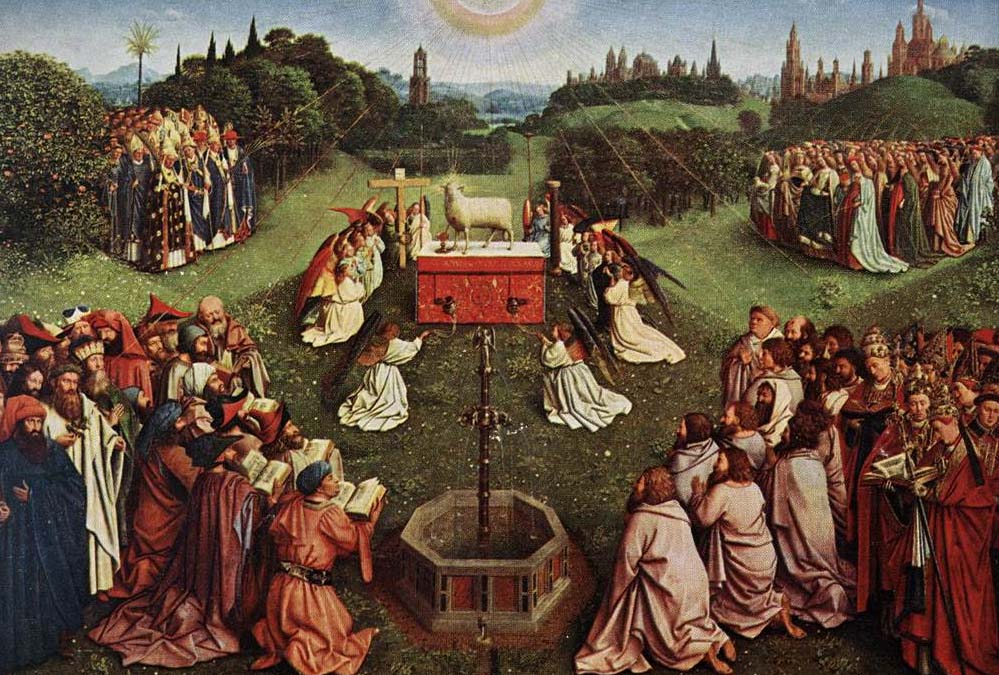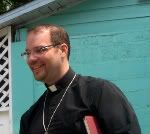a priest's musings on the journey
Wednesday, June 06, 2007
The Solemnity of the Body and Blood of Christ (Reflections a day early)

The Word is all to the child, both father and mother and tutor and nurse. "Eat ye my flesh," He says, "and drink my blood." Such is the suitable food which the Lord ministers, and He offers His flesh and pours forth His blood, and nothing is wanting for the children's growth. O amazing mystery. Clement of Alexandria, The Instructor, AD 200
"The Eucharist is the Sacrament of Love; It signifies Love, it produces Love," St. Thomas Aquinas
Since the 13th century the Church has paused on the Thursday after Trinity Sunday to reflect upon the mystery of the Most Blessed Sacrament of the Altar and to adore the presence of Christ in the Sacrament that transforms us to be the Body of Christ in the world. The Church also commemorates the Gift of the Holy Eucharist on Maundy Thursday, when we recall Christ's command to love one another; however, on this day we are so focused on the Passion of our Lord, that we can not celebrate the joy if the gift. The Solemnity of Corpus Christi allows us to celebrate the gift of Christ's Body and Blood with unfettered joy.
The feast was insituted by Pope Urban IV after two mystical visions that were reported to him. The first is the Miracle of Bolsena, which happened in A.D. 1263. Peter of Prague was a holy, devout German priest; however, he had some doubts about the Real Presence. During a pilgrimage to Rome, he stopped at the Church of St. Christina to offer Mass, and as he elevated the Host, it began to bleed. Not only was he convinced of the Real Presence, but he rushed to meet Pope Urban IV in Orvieto, bringing the Host with him. The miracle was declared, and the Host is still on display at the Cathedral of Orvieto today.
The second vision was given to St. Juliana of Mont Cornillon (A.D. 1193-1258), an Augustinian nun who saw a vision of a full and beautiful Moon marked by a black spot. The black spot was a sign of sorrow that there was no joyous celebration of the Eucharist in the entire Church calendar.
In response to both of the above, Pope Urban IV eventually published a Bull, Transiturus, in A.D. 1264, which made this Feast a part of the calendar. )
Part of the traditional celebration has included the Corpus Christi Procession, which developped later than the creation of the feast, as a means of encouraging the faithful to adore and gaze upon the Presence of Jesus Christ in the Blessed Sacrament. In York, England, the Corpus Christi Procession included a series of mystery plays that in the course of a day, re-presented the history of salvation from the Creation to the Final Judgement. Throughout medieval Europe, the Corpus Christi Procession often overtook the town, evolving into grand parades with floats depicting scenes from the life of Christ. People would- and still do in many Catholic countires, decorate their homes with greens and wreaths to honor the passing of the Blessed Sacrament.
 The feast is a public holiday in many countries, including Brazil, Chile, Croatia, Germany, Austria, Poland, and Portugal.
The feast is a public holiday in many countries, including Brazil, Chile, Croatia, Germany, Austria, Poland, and Portugal. This feast day is especially significant to me because it was the Blessed Sacrament that led me out of the Pentecostal Church into the Episcopal Church. I still remember the first Mass I attended. It was an anglocatholic Mass, and I was hooked from the moment the thurifer entered the nave and I smelled that sweet aroma of incense. But I was transfixed as the priest elevated the Host at the consecration. I had no sacramental theological instruction at that point, so I could not articulate a belief in the Real Presence; but intuitively, I felt Jesus Christ. I felt as close to God as I ever had. Later, I began to read the Fathers and Doctors of the Church, who gave some theological framework to what my heart already knew in experience. I still sneak into the church and kneel before the Reserved Sacrament whenever I get a chance; I still feel a closeness to Jesus there that I do not experience in any other way. In my moments of sorrow, grief,and loneliness, I only need to spend a few minutes alone with Jesus present in the Sacrament of the Altar, and I am refreshed and at peace; only a moment's gaze at the beauty of Christ, hidden in the bread, but seen in my heart, takes me to those outstretched arms that are eager to embrace my soul with the invitation, "Come unto me... and I will give you rest."
"My eyes, I have filled with Jesus upon Whom I have fixed them at the Elevation of the Host at Holy Mass and I do not wish to replace Him with any other image," - St. Colette
"He who made thee is made in thee. He is made in thee through whom you were made.... Give milk, O mother, to him who is our food; give milk to the bread that comes down from heaven." - St. Augustine
A homily for Corpus Christi by Pope John Paul II here.
:: posted by Padre Rob+, 1:35 AM
3 Comments:
Sadly Corpus Christi has like Ascension been transferred to next Sunday in the UK to match up with Ireland. Shortage of priests is blamed!
Excellent post. If you have not yet read this book, may I recommend a superb treatment of eucharistic ecclesiology, "Sacrament of Salvation" by Paul McPartlan. (I am in no way associated with the publication - it is just that is is a marvellous theological treatment on the subject which made an outstanding meditation for me. I thought you may enjoy it as well.)
Blessings - Elizabeth
Blessings - Elizabeth
Elizabeth, thank you for the book suggestion; it sounds like something I'd like to read.
peace and blessings
peace and blessings


